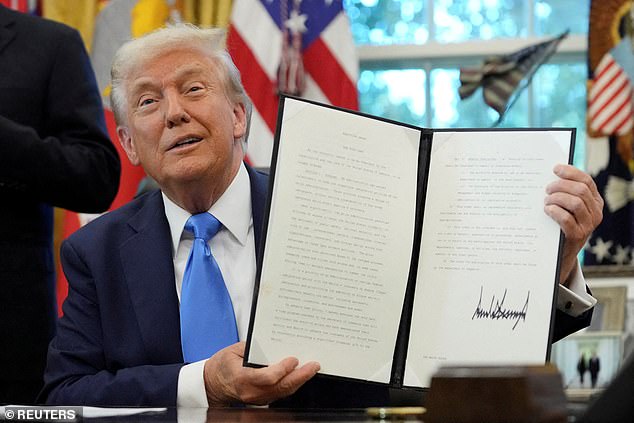- Investment bank Berenberg slashes US economic growth forecasts
- Comes as UK considers axing some fees for skilled overseas workers
A new $100,000 fee for skilled worker visas introduced by President Donald Trump will weigh on economic growth and put the US at risk of recession, analysts have warned.
The White House confirmed over the weekend the US would immediately start charging the levy every time a company makes a request to bring in a skilled worker from another country via the H-1B visa.
The move could have a serious impact on the country’s all-important technology sector, which heavily relies on importing talent from overseas.
And, when combined with Trump’s other attempts to wean the US off foreign labour, the President’s new H-1B fee could put the brakes on the country’s economic output, according to investment bank Berenberg.
Berenberg on Monday slashed US growth forecasts for this year from 2 to 1.5 per cent, as economist Atakan Bakiskan decried ‘yet another policy mistake’ and more ‘anti-growth policymaking’ from the Trump administration.

Trump Gold Card: New H1B visa will introduce $100,000 fee to apply to import skilled foreign labour
Bakiskan said: ‘Deportation efforts, attempts to strip work permits from existing employees, and a hostile environment for foreign workers have already caused labour force growth in the US to nearly flatline.
‘With the new H1B policy, the labour force is more likely to shrink than expand going forward. The future of economic growth now depends almost exclusively on productivity gains.
‘However, by making it very expensive for companies to attract foreign talent, and by forcing some international students to leave the country after graduation, the brain drain will weigh heavily on productivity.’
He warned that even 1.5 per cent growth ‘may soon look optimistic’, with ‘the erosion of trust in institutions, a loss of human capital, tariffs, chronic uncertainty, and unsustainable fiscal policies’ hiking ‘the tail risk of a financial crisis in the US’.
‘In the long run, they may set a path for an even weaker dollar and higher long-term yields,’ he added.
‘Can the economy still grow with no job creation? Yes, but at a slower rate and with a higher risk of stagnation or recession.’
Britain could CUT visa fees for skilled workers
It came as reports suggested the UK is considering abolishing some visa fees for skilled overseas workers.
The Financial Times said Prime Minister Keir Starmer is looking at cutting fees for a fast-track visa to settlement in the UK designed to attract top talent in science, engineering, humanities, medicine, digital technology or arts and culture.
Britain’s global talent visa, introduced by Boris Johnson 2020, costs £766 to apply for, with partners and children paying the same fee. There is also an annual health surcharge fee of £1,035.
A total of 3,901 people were granted the visa in the year to June 2023, according to the FT, marking a 73 per cent rise on the previous year.
Neil Wilson, UK investor strategist at Saxo Markets, said the new US visa fees could prove ‘tricky’ for tech and finance companies and weigh on their share prices later today, noting Amazon alone employs 14,000 people on H-1Bs.
Victoria Scholar, head of investment at investing platform Interactive Investor, added: ‘US futures are pointing to a slightly lower open after fresh all time highs for the S&P 500 and the Dow on Friday.
‘Markets await the fallout from Trump’s crackdown on immigration by raising the H-1B application fee to $100,000.’
DIY INVESTING PLATFORMS

AJ Bell

AJ Bell
Easy investing and ready-made portfolios

Hargreaves Lansdown

Hargreaves Lansdown
Free fund dealing and investment ideas

interactive investor

interactive investor
Flat-fee investing from £4.99 per month

InvestEngine

InvestEngine
Account and trading fee-free ETF investing
Trading 212
Trading 212
Free share dealing and no account fee
Affiliate links: If you take out a product This is Money may earn a commission. These deals are chosen by our editorial team, as we think they are worth highlighting. This does not affect our editorial independence.
This article was originally published by a www.dailymail.co.uk . Read the Original article here. .

